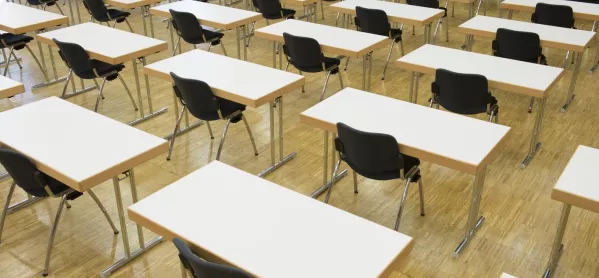- Home
- Ofqual: School GCSE records given more weight on grades
Ofqual: School GCSE records given more weight on grades

Ofqual has said that schools’ historical performance at GCSE and A level would be given more weight where needed to mitigate against ‘optimistic’ teacher-assessed grades this year, following its consultation on the grading process this summer.
The exams regulator has ruled that if schools felt unhappy with the grades awarded this year because they felt that their current pupils would have outperformed previous year groups, the “best way for students to demonstrate their abilities will be to take exams in the autumn series”.
The regulator made its decision after some respondents to the consultation had raised concerns over potential unfairness to pupils in schools with historic low performance.
The exams regulator has also decided that teacher-assessed GCSE and A-level grades awarded to pupils this summer will not need to be checked for bias separately under equalities law, as had been called for by some charities and think tanks, including the Sutton Trust.
However, Ofqual says it has updated the guidance for headteachers to remind them of their duties “under the Equality Act 2010 and to suggest how they might identify indicators of systematic under- or over-prediction within their centre in past years”.
Ofqual said that 82 per cent of over 12,600 respondents to its consultation agreed that the regulator should adopt the grading process into its regulatory framework this year.
Some of the key decisions from the consultation are:
Heads must sign a declaration that teacher grades are accurate
Exam boards should only accept schools’ assessment grades and rank orders of pupils where headteachers or deputies have signed a declaration stating they are accurate.
Leaking pupils’ grades or rank order will be viewed as malpractice
Disclosing information about pupils’ rank order or teacher-assessed grades should be investigated by exam boards as potential malpractice.
Schools’ historical performance will have more weight than teacher-assessed grades
The standardisation model will place more weight on a school’s historical performance than teacher-assessed grades. Ofqual said that “there is, unfortunately, no way that the process can distinguish between unconscious optimism on the part of centres, inflation in centre assessment grades and the possibility that individual students or cohorts of students would actually have done much better this year than statistics from previous years would predict”, and that trying to mitigate this through giving more weight to teacher-assessed grades in standardisation would create a less fair playing field for all.
The standardisation model will, therefore, place more weight on historical performance of schools “where that will increase the likelihood of students getting the grades that they would most likely have achieved had they been able to complete their assessments in summer 2020”.
Improving schools will not have their trajectory taken into account
The trajectory of school results will not be included in the standardisation process - reflecting whether school performance has improved or deteriorated over the last few years.
The rank order of pupils will not be changed to account for bias
The rank order of pupils will not be modified to account for bias against pupils based on their socioeconomic or ethnic background. Ofqual said it will consider potential issues of bias when finalising the standardisation model.
Pupils cannot challenge their grades
Pupils will not be able to challenge their teacher-assessed grade or their rank order in their school through the appeals process. They will be able to ask their school whether it made a mistake when submitting their grade and order position to the board, and will be able to raise a complaint to their school or exam board if they have evidence they were discriminated against.
Schools will be able to appeal on the basis of incorrect data
Schools will be able to appeal to exam boards on the grounds that the board used incorrect data when calculating grades, or incorrectly communicated the grades calculated. An appeal based on a school submitting incorrect data to the board would need to be based on clear evidence.
Schools with changing demographics could appeal results
Ofqual is investigating how schools could appeal results if their demographic make-up of pupils has changed significantly, meaning the use of key stage two data or GCSE results by the standardising model would be inaccurate. However, this will not be possible to take into account before exam results are released but could form part of the appeals process.
Exam boards won’t need consent of all pupils in appeals
Exam boards will not need the consent of all pupils affected by an appeal before they consider an appeal, but where an appeal is brought, the grades of pupils not involved in the appeal should be protected.
Those involved in the initial calculation of grades can also be involved in appeals.
Schools cannot appeal against the model
Schools and pupils will not be able to appeal against the standardisation model itself.
Sally Collier, Ofqual’s chief regulator, said: “In the unprecedented circumstances we face this summer, these exceptional arrangements are the fairest way of making sure students have the grades they need in time to progress to further study or employment.
“It is important that students; their parents, carers and teachers; and others who rely on these qualifications, such as universities and employers, have had an opportunity to feed back views. I would like to thank everyone who has taken the time to respond.”
Keep reading for just £1 per month
You've reached your limit of free articles this month. Subscribe for £1 per month for three months and get:
- Unlimited access to all Tes magazine content
- Exclusive subscriber-only stories
- Award-winning email newsletters



